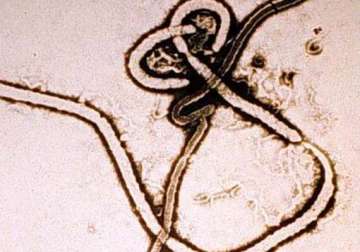London: Researchers at the University of Liverpool have made a breakthrough that can lead to a cure for the deadly Ebola virus currently sweeping through West Africa, media reports said.
The university has said the experts stumbled across an existing drug used in the treatment of severe heart disease, which could be adapted to fight the contagious Ebola virus, Xinhua reported Saturday.
A team from the Health Protection Research Unit in Emerging Infections, based at the University of Liverpool's Institute of Infection and Global Health, have been investigating new ways to treat Ebola.
In collaboration with Public Health England, the team has been looking at how Ebola virus hijacks proteins inside cells, and then seeking ways to stop this from happening.
They looked at what proteins inside a cell are critical for the functions of Ebola virus and are hijacked by the virus to help with infection.
One of the proteins they have targeted is known as VP24. This protein disrupts signalling in infected human cells and disrupts the body's immune system and the fight against the virus.
From there, the Liverpool team looked at whether any existing drugs already block the function of this particular protein. They found the heart drug ouabain, when administered, can reduce the virus' replication.
The team said further tests need to be done, but as the heart drug is already in use, much of the work to test whether it is safe for humans has already been completed.
This, they said, would potentially speed up the time it could take get the treatment to Ebola patients in need.
The study was led by Julian Hiscox from the university's Institute of Infection and Global Health and Roger Hewson at Public Health England.
“This study shows how existing therapeutics can be identified and potentially repurposed for anti-viral therapy. The technique of using existing and tested drugs for a different purpose can save considerable time and ultimately, lives,” Xinhua quoted Hiscox as saying.
The Ebola outbreak, by far the largest in the nearly 40-year history of the disease, has infected 4,269 people and killed 2,400 this year in three West African countries, Guinea, Liberia and Sierra Leone, according to the WHO.
Latest World News
